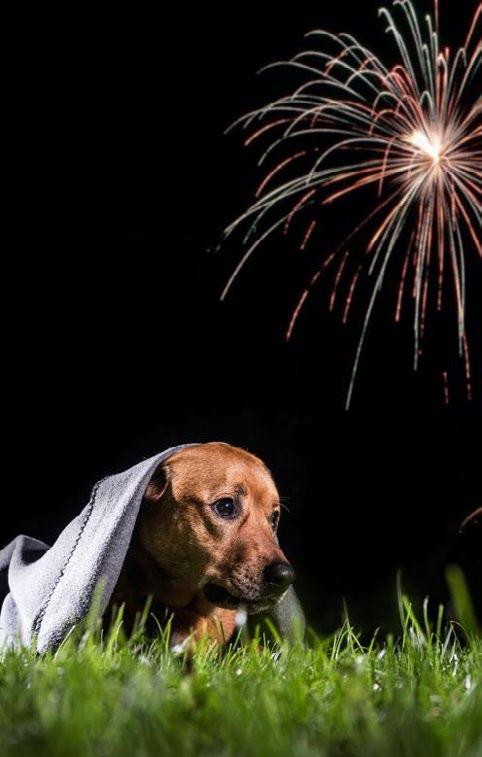
3 minute read
How to keep your pets calm and happy during New Year’s Eve fireworks
JAN HOOLE
FIREWORKS are a brilliant way to celebrate special occasions such as New Year’s Eve as well as big sporting events and religious holidays – right?
Advertisement
Not if you happen to be an animal. All animals, domesticated and wild, are hardwired by evolution to find loud noises frightening.
It’s an automatic response to an unidentified threat, which may cause the animal to bolt before the brain has had time to process the information the ears are presenting. The only way the response can be changed or reduced is by training, desensitisation or habituation to the noise. It’s easy to see why fireworks and thunder are so frightening to animals.
They are loud, sudden and send shock waves through the air and the ground. In technical terms they activate the auditory startle response.
Many dogs, cats and other creatures spend Guy Fawkes, New Year’s Eve and Diwali in a state of terror. A study in the UK found up to 49% of owners reported that their dogs were afraid of noises, and fireworks were the number one cause.
Thunderstorms and gunshots were the next two most common issues.
The good news is we can sometimes help our pets to overcome fear, or prevent them developing it, with training and management techniques.
The most important time for socialising dogs and getting them used to “scary stuff”, is the first 12 weeks of life: the socialisation period. For kittens, the window is even shorter: up to seven weeks. During this time, they need to get used to the idea that unexpected, loud, bright, confusing things may happen and they are nothing to worry about.
If you have been able to do this with your pet during those first crucial weeks, then you may have no problems.
If for any reason you have not done that, or your pet is frightened in spite of all your efforts, there are still a things you can do to help them during fireworks or thunderstorms.
Dogs and cats often feel more secure if they have a small, enclosed space to hide in when they are afraid, so providing a den can help.
This can be as simple as an area between two armchairs, or a small table with a blanket draped over.
Cats will often get under the bed or behind the sofa. For severe cases ask your vet to prescribe medication. Make sure that both cats and dogs are indoors well before the fireworks start, to prevent them running away in a panic and getting lost or injured. Stay at home with your companion animal to give them added security and help them to stay calm.
Larger animals, including horses, can be more difficult to deal with. Being flight animals, their reaction to loud noises is to run as fast as possible in the opposite direction.
As with all animals, desensitisation to the loud noise beforehand is the best solution. Desensitisation to loud noises can prevent horses from injuring themselves during fireworks events. Managing horses during fireworks events is crucial, but it can be a difficult decision whether to leave your horse out or bring it into the stable. Some prefer to run around outdoors while others feel more secure inside.
We can help our pets overcome their fear or give them some comfort with training, but there is little we can do to reduce the distress of wild animals. We need to tackle the problems caused by fireworks, reducing the decibel level of displays, or removing the bangs altogether is the answer. Would fireworks be any less beautiful if they were silent? | The Conversation








